DSCC Regional Manager Earns Outstanding Field Instructor Award
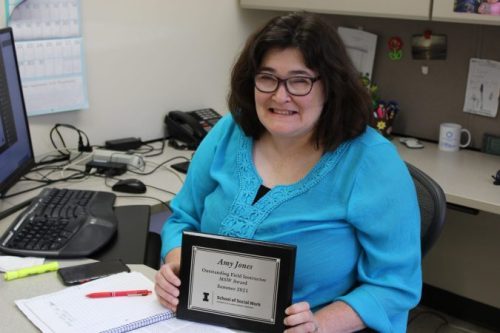
UIUC’s School of Social Work recognized Amy Jones for her dedication and excellent learning experience for interns
Sruthi Thinakkal says her internship with the University of Illinois Chicago’s Division of Specialized Care for Children (DSCC) shaped her as a social worker and taught her the meaning of true teamwork.
Amy Jones, Regional Manager of DSCC’s Olney and Marion regional offices, was an enthusiastic and motivating mentor throughout Sruthi’s experience.
Amy has now received the Outstanding Master of Social Work (MSW) Field Instructor Award for the summer 2021 semester. The honor is from the University of Illinois Champaign-Urbana’s (UIUC) School of Social Work.
“Receiving this award was such a nice surprise! I’m truly honored but never expected it,” Amy said.
The School of Social Work gives the award during each internship rotation to a field instructor who has provided exceptional teaching/mentoring for their MSW intern.
“Based on Sruthi’s nomination letter, it is apparent that (Amy is) dedicated to providing an excellent learning experience for the students, and the School of Social Work is very appreciative,” MSW Field Director Lindsey Trout said in an email announcing the award.
Sruthi nominated Amy for the award after spending two semesters with DSCC’s Marion and Olney offices in 2021. (You can read more about how Sruthi’s internship provided life-changing experiences and lessons.)
“It had been a little while since I’d submitted the nomination, and I’ve been so busy that I completely forgot,” Sruthi said. “It made me so happy! I could go on and on about how Amy shares information and is always willing to help others. It was such a nice surprise, but I just knew she would win!”
Sruthi now works in Chicago with the Rush Craniofacial Center team. She credits her internship with preparing her for a job she loves.
“I gained so many skills that have directly impacted my career,” Sruthi explained. “DSCC taught me so much about working in tune with families, the grief process, the importance of teamwork and listening, and how a monthly call can make such a difference in helping families feel supported and connected.”
Amy says interns aren’t the only ones who benefit.
“It’s a mix of seasoned and new that brings fresh ideas and different perspectives to the workplace,” Amy said. “It’s exciting to watch their growth and know that they’re building a ‘toolbox’ of skills that will serve them well as they move on in their careers. It’s equally rewarding learning from them along the way.”
The Olney and Marion regional offices have recently welcomed two new interns to their team.
“I’m looking forward to learning as much from them as they will from us,” Amy said. “I enjoy being able to talk about the world of social services and sharing about DSCC but It’s really a team effort. All of us work to partner with our families, to help them know about and connect with the services they need.”
Amy’s award has a place of honor in her office – and in her heart.
“The award isn’t just mine. It’s for all of us.”
Congratulations, Amy, on your well-deserved honor!
Formula Shortage Resources for Families
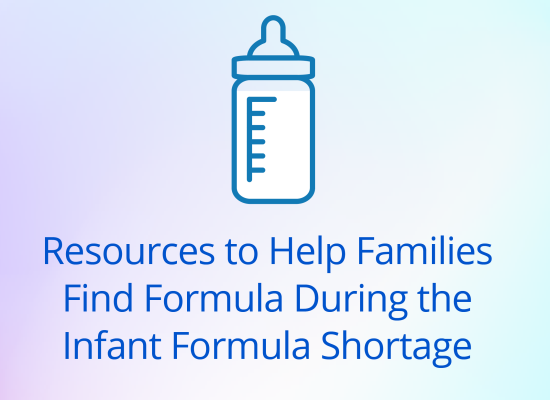
Helpful information and tips to find formula and keep children healthy
The infant formula shortage continues to affect families across the country.
Formula is not only important for babies’ nutrition but also for some young children, teens and adults with medical needs.
Several resources are available nationwide and here in Illinois to help families during the shortage:
- The U.S. Department of Health and Human Services (HHS) website has resources in a variety of languages to help families find infant formula during the shortage. These resources include information on safe substitutes, formula company contacts and community programs.
- The Illinois Department of Human Services (IDHS) has trained caseworkers to help families with formula questions. You can contact the IDHS Help Line at (800) 843-6154. The Help Line is primarily for Supplemental Nutrition Assistance Program (SNAP) and Women, Infants and Children (WIC) participants but is open to all Illinois residents.
- For Illinois WIC participants, a waiver now allows for flexibility in the size and type of formula available to buy with WIC benefits. More details are on IDHS’ “Having Trouble Finding Formula” page.
- Illinois WIC programs also provide a wide range of support for breastfeeding mothers and funds for healthy foods, including fresh fruits and vegetables. More information and updates can be found on the Illinois WIC website. Families can also call (217) 782-2166 for additional support
- Illinois WIC programs also provide a wide range of support for breastfeeding mothers and funds for healthy foods, including fresh fruits and vegetables. More information and updates can be found on the Illinois WIC website. Families can also call (217) 782-2166 for additional support
- HealthyChildren.org, the parenting website of the American Academy of Pediatrics, provides tips on finding baby formula during the shortage and what you may safely consider if you can’t find any. The site is updated regularly with helpful information and the latest guidance.
- The U.S. Food and Drug Administration (FDA) has released information on the international formulas that will soon be on store shelves in the United States. Some of these formulas have different mixing guidance and will require conversion from milliliters to ounces. The FDA has a “Tips for Preparing Imported Infant Formula” handout available to help. (The handout is also available in Spanish.)
Remember that you should not water down your baby’s formula to stretch it out. You also should not make formula at home or discard formula unless it is expired or part of the recall.
HHS notes that in most cases, you can feed your baby any brand of formula that is available.
If your child has special health needs, be sure to check with their doctor about medically appropriate and safe feeding alternatives. Your doctor may have samples in stock or know of other local organizations that can help.
Please contact your pediatrician for guidance on adjusting feeding practices and be sure to stay in touch about any issues or concerns with your child’s nutrition.
DSCC and State Health Department Partner to Improve In-Home Nursing Options for Families

A new licensure process for nursing agencies will help provide more options for children and adults in need of in-home nursing care
The nationwide nursing shortage has affected many Illinois families in need of in-home shift nursing care for their children with complex medical needs.
There is a constant demand for more in-home nursing care options in all parts of the state, both rural and urban.
The University of Illinois Chicago’s Division of Specialized Care for Children (DSCC) has partnered with the Illinois Department of Public Health (IDPH) to help meet this need and give families more nursing care options.
DSCC worked with IDPH to change how our enrolled nursing agencies are licensed to serve Illinois counties. Nursing agencies can now be licensed to serve all of Illinois instead of only individual counties.
This change should make it easier for nursing agencies to serve more parts of the state.
Before this change, nursing agencies could only operate within their approved service county area. Nursing agencies had to request approval for each county they wanted to serve.
This process made it difficult for nursing agencies to expand coverage to areas in need. Our participants who receive in-home shift nursing through the Home Care Program could only receive services from nursing agencies licensed for their specific county.
Now all nursing agencies who are licensed and enrolled with DSCC in good standing may serve all Home Care participants in any part of the state.
This broader statewide approach to nursing agency licenses will offer more available nursing options to our participant families.
Please note that each nursing agency must decide if it wants to expand its service area to other parts of the state. This decision is based on nursing staff availability.
We are thankful for IDPH’s partnership to help meet this important need for our participants and their families!
Public Comment Period for MFTD Waiver Updates
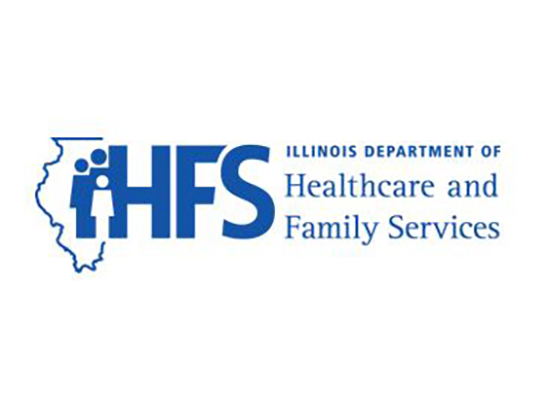
The deadline to share feedback is June 30.
Families have an opportunity to share feedback on proposed updates to the Medicaid Home and Community-Based Services Waiver for Medically Fragile, Technology Dependent (MFTD) Children.
The Illinois Department of Healthcare and Family Services (HFS) is the Medicaid agency responsible for the MFTD waiver. Many families in the Home Care Program have children who receive services through the MFTD waiver.
HFS must renew Illinois’ MFTD waiver every five years. HFS and the Division of Specialized Care for Children (DSCC) have partnered to make several changes as part of this year’s renewal process.
To review the full list of waiver updates, you can:
- See page 2 of the electronic copy of the proposed renewal application.
- Review a hard copy at HFS’ offices at:
- 201 South Grand Ave. E.,
Springfield, IL 62763 - 401 S. Clinton
Chicago, IL 60607
- 201 South Grand Ave. E.,
HFS now seeks public input on these changes. (You can read the public comment notice on the HFS website.)
The deadline to provide feedback is June 30.
You can share your feedback in two ways:
- Via email to HFS.HCBSWaiver@illinois.gov
- Via mail to the Illinois Department of Healthcare and Family Services, Attention: Waiver Operations Management, 201 South Grand Ave. E., 2FL, Springfield, IL 62763
HFS will send your comments to the federal Centers for Medicare and Medicaid Services as part of the waiver approval process.
If you have questions, please contact HFS’s Waiver Operations Management Unit at (217) 524-4148 or (844) 528-8444.
Resources for Special Needs Families During COVID-19 Pandemic
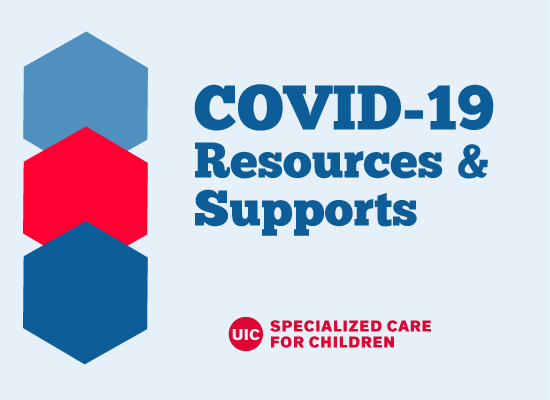
Meals, financial help, health tips, condition-specific information, learning tools and more to support families of children with special healthcare needs.
Parents and caregivers have a lot to juggle as they care for a child with special healthcare needs amid the coronavirus disease 2019 (COVID-19) outbreak.
The uncertainty and required social distancing can pose unique challenges, questions and concerns.
The University of Illinois Chicago’s Division of Specialized Care for Children (DSCC)’s team of professionals is here to help.
We’ve compiled a list of resources to help families find the right support: https://dscc.uic.edu/browse-resources/covid-resources/.
The list includes places offering free meals, utility assistance, free Wi-Fi, health tips, educational websites, activities during social distancing and condition-specific information.
Resources are also broken down by our regional office locations.
We’ll continue to update this list as new resources become available. Please check back often for the latest information.
If you have a resource to add to our list, please email us at dscc@uic.edu.
Tips for Medical Supply Preparations During COVID-19 Outbreak

We’re here to help participants and their families plan and take the proper precautions with their medical supplies during the COVID-19 outbreak.
Many families enrolled with the University of Illinois at Chicago’s Division of Specialized Care for Children (DSCC) rely on medical supplies for their child’s care.
Now is a good time to plan for how to keep your supplies properly stocked through the current coronavirus disease 2019 (COVID-19) outbreak.
We suggest you reach out to your child’s medical provider about how to safely reuse and/or make supplies last longer. This information can help you act in the best interest of your child in case there’s a need to conserve medical supplies in the future.
We also recommend asking your provider about getting extra necessary medications to have on hand or using a mail-order option.
Your DSCC Care Coordinator is also available to discuss strategies and help you feel prepared and well-equipped for your child’s care in the weeks and months ahead.
Please reach out to your local regional office or call us at (800) 322-3722.
Important COVID-19 Update for DSCC Families
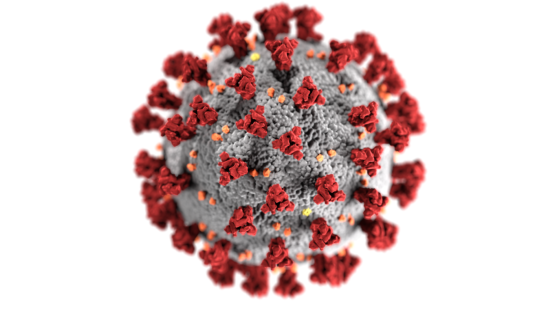
DSCC taking steps to protect our participants, their caregivers and our staff, including suspended home visits and limiting office visitors.
The University of Illinois at Chicago’s Division of Specialized Care for Children (DSCC) has an important update about the coronavirus disease 2019 (COVID-19) pandemic.
We want you to be aware of some precautions we are taking to protect our program participants, their families/caregivers and our DSCC team.
We are limiting visitors in our office until the guidance changes. We feel this step is necessary to protect the participants of our program and our staff.
If you arrive at one of our offices, you will be asked to call to tell us more about how we can help you.
We are also suspending home visits or other face-to-face visits until the current situation improves.
DSCC Regional Offices plan to remain open. If we have to close an office, we will still have staff available through our other DSCC locations who can help you get the care you need.
Since the guidance on ways to slow the spread of coronavirus is evolving, please watch our website for continued updates.
Our DSCC team remains committed to our mission to partner with Illinois families and communities to help children and youth with special healthcare needs connect to the services and resources they need.
We appreciate your patience and understanding as we all do our part to help slow the spread of the coronavirus.
Be well!
2020 Census Matters for Children With Special Healthcare Needs
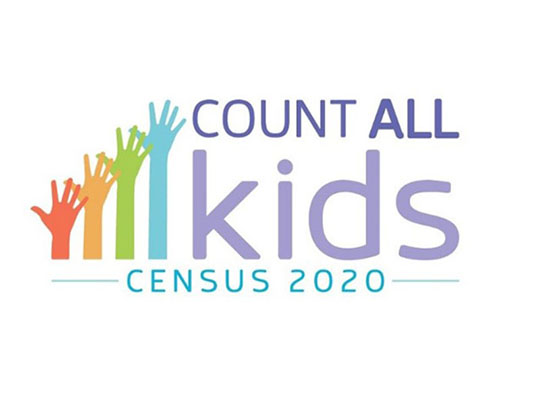
The count helps support key programs and services for children and families.
Every 10 years, the U.S. Census Bureau counts all people in the United States. This count determines how much federal money is available for services and programs for children, including those with special healthcare needs.
By filling out the 2020 census form, parents can help ensure their children have the resources they need.
In March, the government will send every household a letter in the mail. This letter has instructions on how to fill out the census form.
The form asks for a count of everyone living at the address as of April 1, 2020. The count should include babies, young children and children with special healthcare needs and disabilities.
During the 2010 census, nearly one million young children were not counted, according to the Association of Maternal and Child Health Programs (AMCHP).
If young children are not counted in the 2020 census, the following programs could lose funds:
- Medicaid
- Children’s Health Insurance Program
- Supplemental Nutrition Assistance Program (SNAP)
- Title I funding
- Individuals with Disabilities Education Act (IDEA) special education funding
- Head Start
- Childcare and Development Block Grants
States and communities also use census data to fund and develop programs and services for children and families.
All census responses are confidential. Your answers are not shared with anyone and are only used to count the number of people in the country.
AMCHP provides a 2020 census fact sheet for parents. (A Spanish fact sheet is also available.) It explains how the census works, how young children should be counted and confidentiality.
The U.S. Census Bureau also provides helpful resources for parents:
You can also watch the Census Bureau video below:
Parent Institute Lectures Available for Families of Children With Hearing Loss
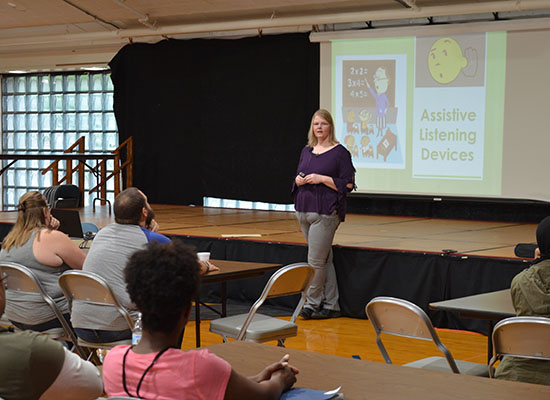
Families can watch video presentations from experts in the field on a range of topics affecting children who are deaf or hard of hearing.
The Institute for Parents of Preschool Children Who Are Deaf or Hard of Hearing is a one-week program for parents of children ages 5 and under who have a significant hearing loss.
It takes place on the campus of the Illinois School for the Deaf in Jacksonville each June. Participating parents attend daily lectures by experts in the field to learn about raising a child with hearing loss.
Lecture topics include:
- Individuals With Disabilities Education Act (IDEA)
- Advocacy
- Communication Options
- Language
- Assistive Listening Devices
- Literacy
- Amplification
The University of Illinois at Chicago’s Division of Specialized Care for Children (DSCC), a supporter of the Institute, is making these presentations available online so they can benefit more families of children with hearing loss.
Videos on each topic are posted on the Illinois Sound Beginnings website.
Parents and caregivers can watch each presentation at their own pace in the comfort of their own home.
If you are interested in participating in the next Institute or would like more information, call us at (800) 322-3722 or email Institute@exchange.dscc.uic.edu.
You can also visit our Events page for more details about the 2020 Institute.
You may also read a recap of the 2019 Institute at https://dscc.uic.edu/institute-provides-support-connection-for-dscc-families-of-children-with-hearing-loss/.
Help Us Improve Services for Children and Families
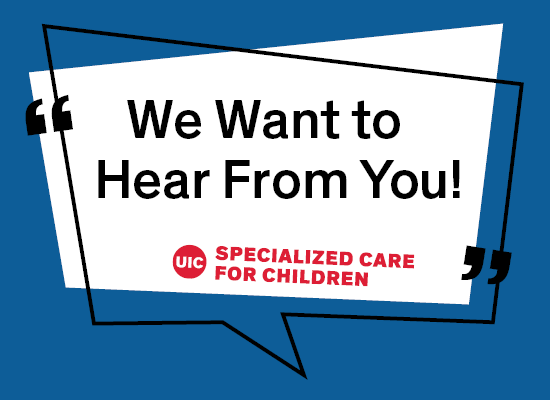
Public input needed for maternal and child health survey
The University of Illinois at Chicago’s Division of Specialized Care for Children (DSCC) wants to hear from you.
We invite Illinois residents to fill out a quick, anonymous survey about the needs of women, infants, children and families across the state.
Your input will help us better understand the health challenges facing Illinois communities. It will also help us determine how new programs and services could help meet communities’ needs.
The survey takes about 10 minutes to complete. Responses are anonymous and confidential. You can click on the English survey link or the Spanish survey link to complete it online.
We are working with the Illinois Department of Public Health to collect survey responses.
This feedback will help guide the work of the Illinois Maternal and Child Health Services Title V Program over the next five years.
We will collect responses through the end of March 2020.
Email DPH.MCH@illinois.gov with any questions about the survey.
We hope to hear from you!


